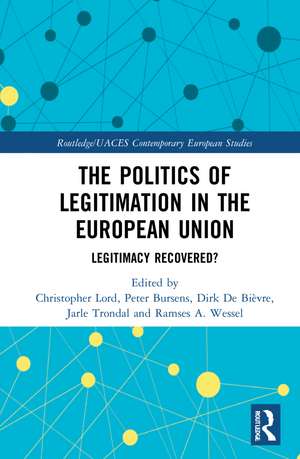The Politics of Legitimation in the European Union: Legitimacy Recovered?: Routledge/UACES Contemporary European Studies
Editat de Christopher Lord, Peter Bursens, Dirk De Bièvre, Jarle Trondal, Ramses A. Wesselen Limba Engleză Hardback – 14 apr 2022
| Toate formatele și edițiile | Preț | Express |
|---|---|---|
| Paperback (1) | 389.66 lei 6-8 săpt. | |
| Taylor & Francis – 29 ian 2024 | 389.66 lei 6-8 săpt. | |
| Hardback (1) | 1006.43 lei 6-8 săpt. | |
| Taylor & Francis – 14 apr 2022 | 1006.43 lei 6-8 săpt. |
Din seria Routledge/UACES Contemporary European Studies
-
 Preț: 312.34 lei
Preț: 312.34 lei -
 Preț: 341.95 lei
Preț: 341.95 lei -
 Preț: 310.84 lei
Preț: 310.84 lei - 9%
 Preț: 1005.57 lei
Preț: 1005.57 lei -
 Preț: 384.86 lei
Preț: 384.86 lei -
 Preț: 325.38 lei
Preț: 325.38 lei -
 Preț: 280.08 lei
Preț: 280.08 lei - 18%
 Preț: 945.80 lei
Preț: 945.80 lei -
 Preț: 275.30 lei
Preț: 275.30 lei -
 Preț: 284.52 lei
Preț: 284.52 lei -
 Preț: 464.54 lei
Preț: 464.54 lei -
 Preț: 466.45 lei
Preț: 466.45 lei - 18%
 Preț: 1057.75 lei
Preț: 1057.75 lei - 18%
 Preț: 1055.51 lei
Preț: 1055.51 lei - 18%
 Preț: 703.79 lei
Preț: 703.79 lei - 34%
 Preț: 822.34 lei
Preț: 822.34 lei - 15%
 Preț: 66.82 lei
Preț: 66.82 lei -
 Preț: 413.33 lei
Preț: 413.33 lei -
 Preț: 284.52 lei
Preț: 284.52 lei - 18%
 Preț: 1000.27 lei
Preț: 1000.27 lei - 18%
 Preț: 699.96 lei
Preț: 699.96 lei -
 Preț: 391.57 lei
Preț: 391.57 lei -
 Preț: 460.69 lei
Preț: 460.69 lei - 18%
 Preț: 1065.06 lei
Preț: 1065.06 lei -
 Preț: 464.54 lei
Preț: 464.54 lei -
 Preț: 315.29 lei
Preț: 315.29 lei - 18%
 Preț: 1054.71 lei
Preț: 1054.71 lei -
 Preț: 483.49 lei
Preț: 483.49 lei -
 Preț: 411.42 lei
Preț: 411.42 lei - 12%
 Preț: 312.43 lei
Preț: 312.43 lei - 26%
 Preț: 850.59 lei
Preț: 850.59 lei - 18%
 Preț: 1058.65 lei
Preț: 1058.65 lei - 15%
 Preț: 701.45 lei
Preț: 701.45 lei -
 Preț: 440.21 lei
Preț: 440.21 lei -
 Preț: 386.51 lei
Preț: 386.51 lei -
 Preț: 462.60 lei
Preț: 462.60 lei
Preț: 1006.43 lei
Preț vechi: 1227.35 lei
-18% Nou
192.60€ • 200.83$ • 160.07£
Carte tipărită la comandă
Livrare economică 21 martie-04 aprilie
Specificații
ISBN-10: 1032101407
Pagini: 322
Ilustrații: 9 Line drawings, black and white; 18 Tables, black and white; 9 Illustrations, black and white
Dimensiuni: 156 x 234 x 19 mm
Greutate: 0.63 kg
Ediția:1
Editura: Taylor & Francis
Colecția Routledge
Seria Routledge/UACES Contemporary European Studies
Locul publicării:Oxford, United Kingdom
Public țintă
Postgraduate and Undergraduate CoreCuprins
Notă biografică
Peter Bursens is Jean Monnet Chair and Professor of Political Science at the Department of Political Science of the University of Antwerp, Belgium.
Dirk De Bièvre is Professor of International Politics at the University of Antwerp, Belgium.
Jarle Trondal is a Professor at University of Agder, Department of Political Science and Management, and a Professor at the University of Oslo, ARENA Centre for European Studies, Norway.
Ramses A. Wessel is Professor of European Law and Head of the Department of European and Economic Law at the University of Groningen, Netherlands.
Descriere
This book examines and investigates the legitimacy of the European Union by acknowledging the importance of variation across actors, institutions, audiences, and context.
Case studies reveal how different actors have contributed to the politics of (re)legitimating the European Union in response to multiple recent problems in European integration. The case studies look specifically at stakeholder interests, social groups, officials, judges, the media and other actors external to the Union. With this, the book develops a better understanding of how the politics of legitimating the Union are actor-dependent, context-dependent and problem-dependent.
This book will be of key interest to scholars and students of European integration, as well as those interested in legitimacy and democracy beyond the state from a point of view of political science, political sociology and the social sciences more broadly.
